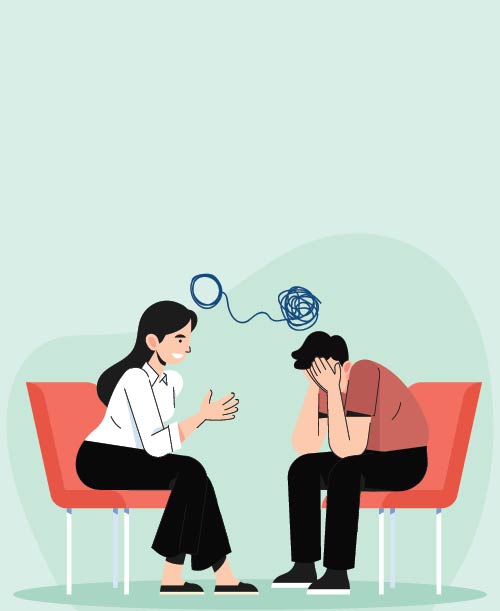Unlocking the Keys of Mental Health: A Summary of Counseling and Therapy Alternatives
Psychological wellness is a complex and critical facet of general health. Various therapy and therapy alternatives exist to resolve different emotional challenges. Each strategy supplies unique benefits and techniques customized to specific demands. Understanding these alternatives is crucial for anybody looking for to enhance their mental health. Mental Health Resources. What elements should one take into consideration when discovering these avenues? The solution may expose a path to a much healthier mood
Recognizing Mental Wellness and Its Importance
Psychological wellness encompasses the emotional, mental, and social wellness of people, considerably affecting just how they assume, really feel, and act. Its significance can not be overemphasized, as it impacts every facet of life, consisting of partnerships, job efficiency, and general high quality of life. Individuals with excellent mental health tend to deal with anxiety much more properly, maintain much healthier relationships, and make informed decisions. Alternatively, inadequate mental health can cause emotional distress, impaired functioning, and numerous mental illness, which might call for expert intervention. Recognizing psychological wellness is vital for recognizing the indicators of distress and the need for assistance. Understanding additionally advertises empathy and lowers stigma, motivating individuals to look for assistance when required. By focusing on mental health and wellness, areas can cultivate environments that sustain psychological well-being, inevitably resulting in much healthier, more resistant people. This structure works as an important step toward reliable psychological wellness counseling and therapy alternatives.
Sorts Of Therapy Methods
Therapy techniques vary widely, each tailored to meet the distinct requirements of people looking for assistance. Among the most common kinds are cognitive-behavioral treatment (CBT), which concentrates on recognizing and transforming unfavorable thought patterns, and person-centered treatment, which highlights empathy and approval. Psychodynamic therapy discovers past experiences and unconscious procedures to understand present habits, while solution-focused short treatment intends to identify services rather than investigate problems.Additionally, family members therapy addresses relational dynamics and communication within family members, cultivating healthier interactions. Group counseling provides a public space for individuals to share experiences and support each other. Other approaches consist of existential treatment, which urges people to discover meaning and function, and art or songs therapy, which uses creative expression as a restorative device. Each technique offers distinct techniques and philosophies, enabling clients to locate one of the most ideal approach for their personal development and recovery journeys.
Checking Out Various Therapy Techniques
In the domain name of mental health therapy, different therapy techniques supply distinct methods to therapy. Cognitive Behavior Treatment emphasizes the connection in between actions and thoughts, while Psychodynamic Treatment checks out unconscious influences on psychological wellness. Additionally, Mindfulness-Based Methods advertise present-moment recognition as a method to improve emotional regulation and general psychological health.
Cognitive Behavior Modification
Cognitive Behavior Treatment (CBT) attracts attention as one of the most extensively exercised and researched techniques in psychological health and wellness therapy. This technique focuses on the affiliation between sensations, behaviors, and thoughts, emphasizing that modifying adverse thought patterns can result in improved emotional health and behavioral changes. CBT is structured, typically entailing a restricted number of sessions, and aims to gear up people with useful abilities to manage their symptoms. It works for a variety of problems, consisting of anxiousness disorders, anxiety, and trauma. By utilizing techniques such as cognitive restructuring and direct exposure therapy, CBT fosters strength and equips clients to face difficulties head-on, making it a beneficial alternative in the landscape of psychological health therapies.
Psychodynamic Therapy Strategies
Psychodynamic therapy techniques supply a deep exploration of the subconscious mind and its influence on habits and emotional wellness. Rooted in Freudian concept, these techniques emphasize the significance of very early childhood experiences and subconscious problems. With methods such as free association, desire analysis, and transference, individuals obtain insight into their sensations and thoughts, fostering self-awareness and understanding. This therapeutic technique encourages customers to discover repressed emotions and unsettled problems, which can be critical in resolving existing emotional challenges. By examining the interplay between past experiences and existing actions, psychodynamic treatment intends to advertise psychological recovery and personal growth. Ultimately, it offers a structure for individuals to discover intricate inner characteristics that affect their mental health.

Mindfulness-Based Strategies
While standard treatments often concentrate on previous experiences, mindfulness-based techniques focus on present-moment recognition as a pathway to psychological well-being. These techniques, including mindfulness-based cognitive treatment (MBCT) and mindfulness-based stress reduction (MBSR), urge people to engage fully with their thoughts and feelings without judgment. Specialists learn to observe their mindsets, fostering a better understanding of emotional triggers and feedbacks. This method not only eases signs and symptoms of stress and anxiety and anxiety but likewise enhances overall psychological resilience. By incorporating mindfulness workouts, such as meditation and deep breathing, clients cultivate a sense of peace and quality. Eventually, mindfulness-based strategies equip people to navigate life's obstacles with boosted understanding and approval, advertising a much healthier partnership with their ideas and emotions.
The Function of a Specialist or Counselor
A proficient therapist or counselor plays a crucial role in sustaining people via their mental health journeys. They supply a secure, non-judgmental area where clients can express their sensations and thoughts freely. Mental Health Resources. By utilizing different restorative techniques tailored per person's demands, therapists aid customers discover underlying concerns that may contribute to their psychological wellness challenges.Therapists provide guidance and devices to handle tension, anxiousness, clinical depression, and other emotional troubles. Their training furnishes them to acknowledge patterns in habits and assumed Clicking Here procedures, facilitating understandings that result in personal development. They additionally cultivate a strong therapeutic alliance, which is essential for successful outcomes.Moreover, specialists continue to be committed to confidentiality and honest criteria, guaranteeing a relying on setting. Inevitably, the function of a specialist or counselor is to empower people, urging them to develop strength and healthier coping techniques while steering through life's intricacies
Just how to Pick the Right Therapy or Therapy Option
Picking the best therapy or treatment choice begins with evaluating private demands. It is necessary to comprehend individual obstacles and objectives prior to checking out different treatment designs. This fundamental step can substantially influence the effectiveness of the selected approach.
Assess Your Demands

How can people successfully assess their psychological wellness needs when assessing therapy or treatment alternatives? First, they should assess their psychological state and recognize specific concerns, such as connection, anxiety, or anxiousness difficulties. Journaling can be a valuable tool for tracking thoughts and sensations gradually. Additionally, people may take advantage of seeking comments from relied on friends or member of the family concerning regarded adjustments in actions or mood. It is additionally practical to assess personal goals for therapy, such as enhancing coping skills or acquiring insight right into personal patterns. Finally, looking into various therapy methods and their viability for certain demands can assist in making an educated selection. Ultimately, self-awareness plays a critical role in picking the ideal course for psychological wellness support.
Check Out Therapy Designs
While going across the varied landscape of treatment options, people must consider different designs of counseling to find the ideal fit for their one-of-a-kind requirements. Cognitive Behavioral Treatment (CBT) concentrates on altering adverse thought patterns, while Psychodynamic Therapy explores previous experiences and subconscious procedures. Humanistic methods emphasize individual growth and self-actualization, cultivating a helpful atmosphere. Furthermore, mindfulness-based treatments cultivate present-moment understanding, helping emotional regulation. For those looking for structure, Solution-Focused Short Therapy targets certain goals and remedies. Group therapy gives a communal setting for common experiences and assistance. Eventually, individuals ought to review their preferences, convenience degrees, and specific difficulties, guaranteeing they select a healing design Check Out Your URL that reverberates with their personal journey towards psychological wellness.
Overcoming Barriers to Looking For Aid
:max_bytes(150000):strip_icc()/VWH-MichelaButtignolCounselingFor-MentalHealth-4000x2700-35491a98e57746399614c4ef7f3833a1.png)
The Benefits of Therapy and Therapy for Mental Health
Looking for assistance for mental health and wellness difficulties can cause considerable renovations in overall well-being. Counseling and therapy supply individuals with a risk-free space to discover their sensations and thoughts, fostering self-awareness and individual development. These specialist solutions gear up clients with find coping methods and analytic skills customized to their distinct situations.Moreover, treatment can decrease symptoms of stress and anxiety, clinical depression, and other psychological wellness disorders, enhancing emotional strength. Regular sessions advertise liability and motivate people to establish and achieve personal objectives. Through numerous healing techniques, such as cognitive-behavioral therapy or mindfulness practices, clients discover to reframe unfavorable thoughts and develop healthier behaviors.Additionally, the restorative connection itself can be a resource of support, helping to battle isolation and loneliness. In general, engaging in counseling and therapy is a proactive step towards accomplishing mental wellness, allowing people to lead even more fulfilling lives.
Frequently Asked Questions
How Much Time Does Therapy or Treatment Typically Last?
The period of therapy or treatment varies substantially, often lasting from a few sessions to a number of months or years. Aspects influencing this consist of the person's specific demands, the kind of treatment, and healing objectives.
What Should I Anticipate During My Initial Session?
Throughout the initial session, individuals can anticipate an introduction, discussion of problems, and the therapist's strategy. They might complete evaluations and establish objectives, cultivating a risk-free atmosphere for open interaction and building connection.

Are There Any Type Of Dangers Connected With Treatment?
Therapy can entail threats, such as psychological discomfort, susceptability, or facing agonizing memories. While these challenges may occur, they can also cause personal growth and healing, making the therapeutic procedure facility yet possibly rewarding.
How Can I Inform if My Therapist Is a Great Fit?
Figuring out if a specialist is a great fit involves reviewing comfort, communication style, and healing method. Favorable relationship and progress towards objectives are indications of an appropriate match, crucial for efficient psychological health and wellness support.
Will My Insurance Policy Cover Counseling or Treatment Sessions?
Identifying insurance policy coverage for therapy or therapy sessions often requires speaking to the insurance service provider straight. Plans differ substantially, so individuals should confirm benefits, co-pays, and any kind of required pre-approvals prior to pursuing treatment solutions. Among the most usual types are cognitive-behavioral treatment (CBT), which focuses on determining and changing unfavorable idea patterns, and person-centered treatment, which emphasizes empathy and acceptance. Psychodynamic treatment explores past experiences and unconscious processes to understand present behavior, while solution-focused quick therapy intends to identify services rather than investigate problems.Additionally, household treatment addresses relational characteristics and communication within households, cultivating much healthier interactions. Various other techniques include existential treatment, which urges individuals to find definition and function, and art or songs treatment, which uses innovative expression as a therapeutic tool. Cognitive Behavioral Therapy emphasizes the link in between actions and ideas, while Psychodynamic Treatment discovers unconscious influences on psychological wellness. Cognitive Behavior Treatment (CBT) concentrates on altering adverse thought patterns, while Psychodynamic Treatment checks out unconscious processes and previous experiences.